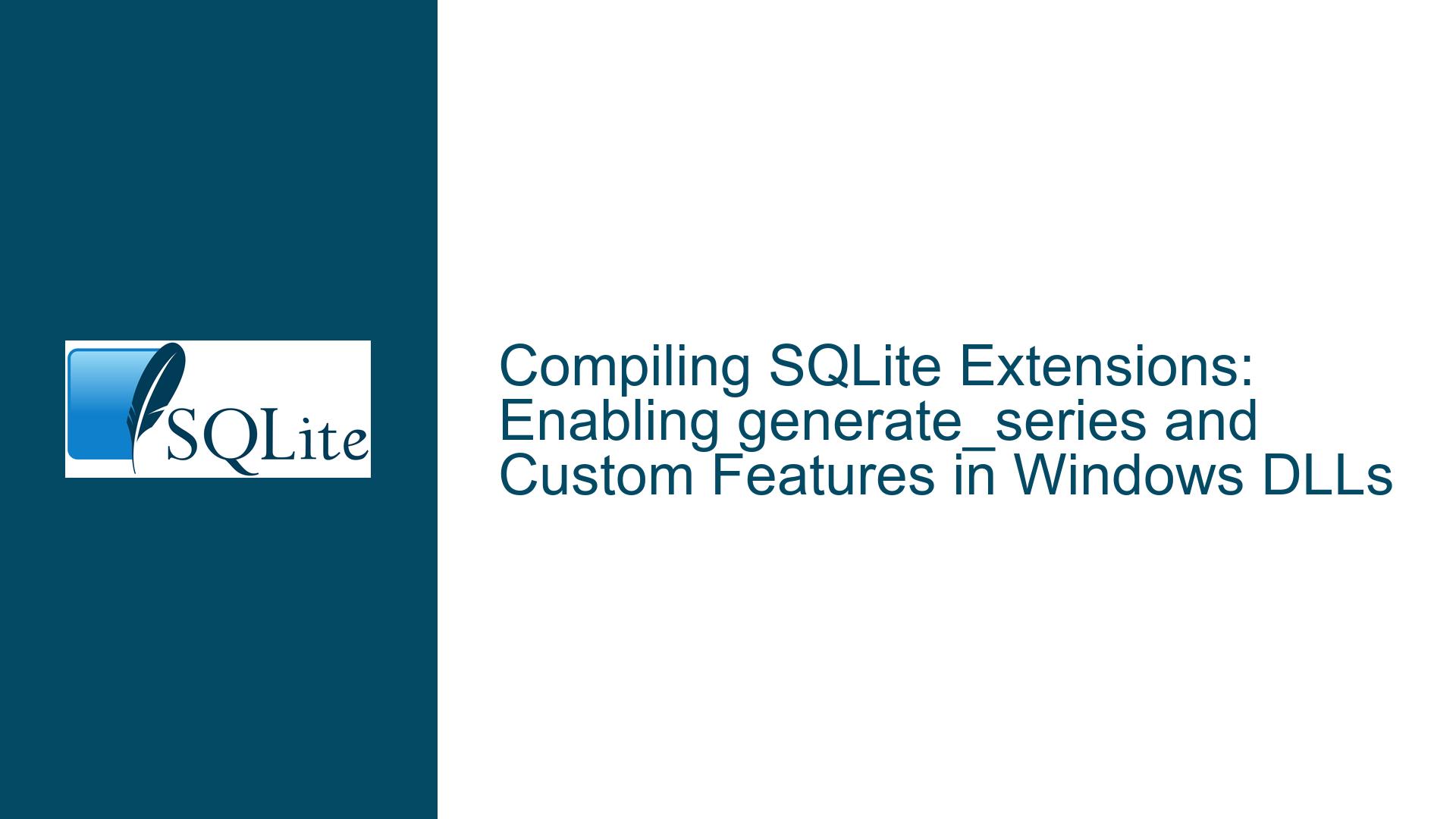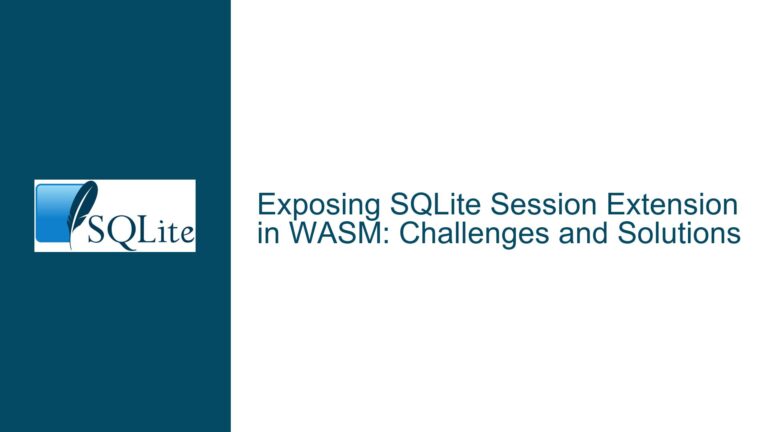Compiling SQLite Extensions: Enabling generate_series and Custom Features in Windows DLLs
Understanding SQLite Extensions, Precompiled DLL Limitations, and Custom Compilation Workflows
The core challenge revolves around two interconnected issues:
- The absence of the
generate_seriesvirtual table in precompiled SQLite binaries. - The process of enabling SQLite features and integrating custom extensions like
fileio.cinto a Windows DLL usingcl.exe.
These problems stem from SQLite’s design philosophy of modularity, where non-essential features are excluded from default builds to maintain a lightweight footprint. The generate_series extension, for example, is part of SQLite’s "extension ecosystem" but not compiled into standard library distributions. Similarly, adding third-party extensions like fileio.c requires manual intervention during compilation.
Why generate_series Is Missing and How SQLite Compilation Decisions Impact Feature Availability
1. SQLite’s Modular Architecture
SQLite’s source code is organized into core components and optional extensions. The generate_series virtual table is classified as an extension and is not included in the precompiled DLLs distributed on SQLite’s website. This exclusion reduces binary size and avoids bloating the library with niche features.
2. Compile-Time Feature Flags
Many SQLite features—including extensions like generate_series—require compile-time directives to activate. For example, enabling generate_series demands defining SQLITE_ENABLE_SERIES during compilation. The precompiled DLLs omit these flags to serve general-purpose use cases.
3. Extension Loading Restrictions
Even if generate_series were available as a loadable extension (e.g., a .dll or .so file), SQLite restricts extension loading by default for security reasons. The precompiled binaries do not include mechanisms to load external extensions unless explicitly enabled via SQLITE_ENABLE_LOAD_EXTENSION.
4. Windows-Specific Build Challenges
Compiling SQLite on Windows with cl.exe introduces toolchain-specific hurdles:
- Header File Configuration: Missing or misconfigured headers can disable features.
- Build Script Customization: The absence of autotools (common in Unix environments) forces manual adjustment of compiler flags.
- Dependency Management: Extensions like
fileio.cmay rely on external libraries (e.g., for filesystem access), requiring linker adjustments.
Step-by-Step Solutions: Enabling generate_series, Compiling Custom Extensions, and Debugging Common Pitfalls
1. Enabling generate_series in a Custom SQLite Build
Step 1: Obtain the SQLite Amalgamation
Download the amalgamation source bundle from SQLite’s download page. This bundle includes sqlite3.c, sqlite3.h, and sqlite3ext.h—the foundational files for compilation.
Step 2: Define Required Compiler Flags
To enable generate_series, pass the SQLITE_ENABLE_SERIES flag to the compiler. For cl.exe, this is done using the /D option:
cl.exe /DSQLITE_ENABLE_SERIES /DSQLITE_API=__declspec(dllexport) /c sqlite3.c
This command compiles sqlite3.c with generate_series support and prepares the object file for DLL creation.
Step 3: Link the DLL
Generate a DLL from the compiled object file:
link.exe /DLL /OUT:sqlite3.dll sqlite3.obj
The resulting sqlite3.dll will include the generate_series virtual table.
Verification
Load the DLL into an application and execute:
SELECT value FROM generate_series(1, 5);
If successful, this returns values 1 through 5.
2. Integrating fileio.c into a Custom SQLite DLL
Step 1: Acquire the Extension Source
Download fileio.c from SQLite’s extension repository. Place it in the same directory as the amalgamation files.
Step 2: Modify the Build Process
Compile sqlite3.c and fileio.c together, ensuring cross-file dependencies are resolved:
cl.exe /DSQLITE_ENABLE_SERIES /DSQLITE_API=__declspec(dllexport) /c sqlite3.c fileio.c
Step 3: Resolve Symbol Dependencies
Extensions like fileio.c may require linking against system libraries. For filesystem operations on Windows, link against kernel32.lib:
link.exe /DLL /OUT:sqlite3.dll sqlite3.obj fileio.obj /LIBPATH:"C:\Path\To\Libs" kernel32.lib
Step 4: Load and Test the Extension
In your application, load the extension at runtime:
SELECT load_extension('sqlite3.dll', 'sqlite3_fileio_init');
Execute a test query to verify file I/O functionality:
SELECT readfile('C:\test.txt');
3. Troubleshooting Common Compilation Errors
Error: "Undefined reference to sqlite3_series_init"
Cause: The SQLITE_ENABLE_SERIES flag was omitted during compilation.
Fix: Recompile with /DSQLITE_ENABLE_SERIES.
Error: "The specified module could not be found" When Loading DLL
Cause: Missing dependencies (e.g., kernel32.lib not linked).
Fix: Explicitly link against required libraries using /LIBPATH and additional .lib files.
Error: "Extension loading is disabled"
Cause: The precompiled DLL restricts extension loading.
Fix: Compile with SQLITE_ENABLE_LOAD_EXTENSION defined:
cl.exe /DSQLITE_ENABLE_SERIES /DSQLITE_ENABLE_LOAD_EXTENSION ...
4. Emulating generate_series Without Compiling Extensions
If recompiling SQLite is impractical, use a recursive Common Table Expression (CTE) to mimic generate_series:
WITH series(value) AS (
SELECT 1
UNION ALL
SELECT value + 1 FROM series WHERE value < 5
)
SELECT value FROM series;
This workaround generates a sequence but lacks the performance optimizations of the native extension.
By dissecting SQLite’s compilation model, addressing Windows-specific build constraints, and providing fallback strategies, this guide equips developers to overcome limitations in precompiled binaries and tailor SQLite to their needs.






